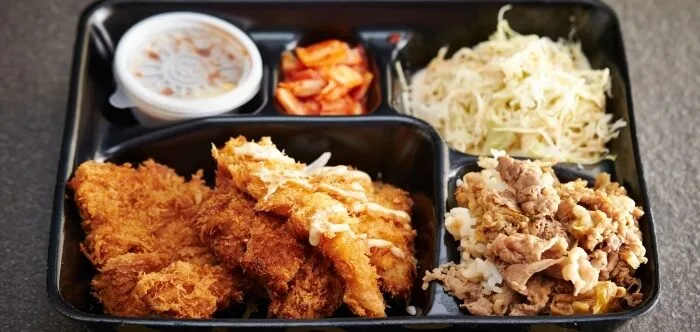In conferences, catering plays a pivotal role in ensuring a successful and enjoyable event. When pondering what do you serve for breakfast at a conference, it’s essential to curate a menu that appeals to a diverse audience.
A top-notch conference breakfast should encompass a variety of options: think fresh fruits for a refreshing start, assorted pastries for a sweet touch, hearty scrambled eggs and bacon for traditionalists, alongside wholesome choices like yogurt and cereals. Beverages are equally important – provide staples such as coffee, tea, and juice.
Additionally, accommodating different dietary preferences is crucial, so incorporating vegan, gluten-free, and dairy-free options is a thoughtful touch. Dive deeper into our article for more detailed strategies on mastering conference breakfast catering.
What is Conference Catering?
Conference catering is a specialized service that focuses on providing meals and refreshments for business or academic gatherings. It’s designed to accommodate large groups, often with diverse dietary preferences and needs. A supportive catering segment can include good breakfast foods for conference, meals, snacks, or drinks in addition. The goal is to enhance the overall experience of attendees through quality food and service.

This type of catering differs from regular event catering by its scale and the variety of options it must offer. Menus are carefully crafted to keep attendees energized and satisfied during long sessions. Efficiency, quality, and variety are key components, ensuring meals are served smoothly and meet everyone’s tastes.
Selecting the right caterer for a conference is crucial; it can significantly impact the event’s success. Caterers not only provide food but also assist in creating a conducive environment for networking and learning. They play a vital role in ensuring the comfort and satisfaction of all participants.
Do Conferences Providing Breakfast at a Conference
Yes, conferences often provide breakfast, recognizing its importance in starting the day right for attendees. A well-balanced breakfast fuels participants, enhancing focus and engagement in the day’s activities. It’s an essential aspect of conference catering, setting the tone for the event.
Offering breakfast at conferences caters to a wide range of dietary preferences and needs. Options typically include continental selections, hot dishes, and healthy alternatives. This variety ensures that all attendees, regardless of their dietary restrictions, can enjoy a satisfying meal.
Moreover, breakfast at conferences is not just about food; it’s an opportunity for networking and socializing. It creates a relaxed atmosphere where attendees can mingle and connect before the formal agenda begins. This aspect of conference breakfasts adds significant value to the overall experience.
What Do You Serve for Breakfast at a Conference?
Selecting the right breakfast menu for a conference can be a key factor in energizing and satisfying attendees. It’s essential to offer a variety of options including general conference food to catering different tastes and dietary needs. Here’s an explanation of what do you serve for breakfast at a conference.
Continental Classics
Continental breakfast items are a staple at conferences, offering a light yet fulfilling start. This usually includes pastries like croissants and muffins, paired with jams and butter. Fresh fruits and assorted cheeses often accompany these baked goods. They provide a quick, easy-to-eat option for attendees on the go.
Hearty Hot Dishes
For a more substantial option, hot dishes are a must. Scrambled eggs and bacon are popular choices, offering familiar comfort. Pancakes or waffles with syrup and butter can be a delightful treat. These items keep attendees full and focused for longer periods.
Healthy Alternatives
Incorporating healthy options caters to health-conscious attendees. Yogurt with granola and fresh fruit is a nutritious and light choice. Oatmeal or porridge, possibly with a selection of toppings, offers fiber-rich sustenance. Smoothies made with fruits and vegetables are refreshing and energy-boosting.
Gluten-Free Options
Gluten-free choices are crucial for inclusivity. Gluten-free breads and pastries ensure everyone has something to enjoy. Cereals like cornflakes or rice puffs can be offered as alternatives. Always label these options clearly to avoid confusion.
Vegan Varieties
Vegan options are increasingly in demand. Plant-based milk alternatives should be available for cereals and beverages. Vegan pastries or breads, made without animal products, cater to vegan diets. Offer a range of fruit and vegetable-based dishes as well.
Beverage Basics
A selection of beverages is essential to complete the breakfast spread. Coffee and a variety of teas cater to different caffeine preferences. Fresh juices like orange or apple provide a healthy, refreshing option. Don’t forget to include water for hydration.
International Flavors
Adding international dishes can spice up the menu. Items like breakfast burritos or shakshuka can offer a unique twist. Asian options like congee or dim sum can be exciting alternatives. These dishes cater to a diverse palate and add variety.
Sweet Sensations
For a sweet finish, include options like pastries or fruit salads. Miniature desserts or pastries can be a delightful treat. Fruit salads offer a fresh, sweet option without the heaviness. These can act as a perfect end to the breakfast experience.
A well-thought-out breakfast menu can significantly enhance the conference experience. Offering a variety of dishes ensures that all attendees start their day satisfied and ready to engage.
Is It Allowed to Bring Your Own Food to a Conference?
Yes, in many cases, bringing your food to a conference is allowed, but it largely depends on the venue’s policy and the nature of the event. Some conferences may have restrictions due to catering agreements or health and safety concerns. It’s always best to check with the organizers beforehand.
Venue Policies
Most venues have specific policies regarding outside food. These are often influenced by exclusive catering contracts or facility rules. It’s crucial to review the venue’s guidelines or inquire directly. Ignoring these policies can lead to unnecessary complications during the event.
Health and Safety Concerns
Health and safety regulations can impact the allowance of outside food. Venues need to ensure food safety standards are met. This is particularly relevant in cases where food allergies or contamination risks are a concern. Organizers might restrict outside food to avoid these issues.
Type of Conference
The nature of the conference can dictate the food policy. Academic or professional conferences might be more tolerant compared to corporate events. Some events include meals as part of the networking experience. In such cases, bringing your food might be discouraged.
Personal Dietary Needs
Attendees with specific dietary needs might be relieved from restrictions. This is especially true for those with allergies or strict dietary regimes. In these situations, organizers usually understand the need for personal food items. Always communicate your dietary needs to the event organizers in advance.
Cultural Considerations
Certain cultural or religious practices may necessitate bringing personal food. Most conference organizers are sensitive to these needs. It’s advisable to inform the organizers beforehand to avoid any misunderstandings. This ensures respect for cultural diversity and inclusivity.
Cost-Saving Measures
Some attendees might prefer to bring their food to save costs. While this is understandable, it’s important to balance cost-saving with adherence to event guidelines. Some conferences introduce conference meal tax deductions offered with minimum cost including at your ticketing. Check if the conference offers any budget-friendly dining options.
Frequently Asked Questions
Attendees are interested in the food items that are served for breakfast at a conference and also looking for similar inquiries and their answers.
What Are Common Breakfast Options for a Conference?
Ans. Common breakfast options include continental breakfasts with pastries, muffins, and fruit; hot breakfasts featuring eggs, bacon, sausage, and pancakes; and lighter options like yogurt, granola, and smoothies. These options cater to a variety of preferences and dietary needs.
What Beverages Should Be Served With Breakfast at a Conference?
Ans. Essential breakfast beverages include coffee, tea, water, and a selection of juices like orange, apple, and cranberry. Consider offering non-dairy milk options and specialty coffees to cater to diverse preferences.
Is It Necessary to Provide Breakfast at a Conference?
Ans. Providing breakfast is highly recommended as it can enhance the attendee experience, encourage timely arrival, and facilitate networking opportunities. It also helps to set a positive tone for the day’s events.
What Are Some Cost-effective Breakfast Options for a Conference?
Ans. Cost-effective options include continental breakfasts with pastries, bagels, fruit, and coffee. To save costs, consider bulk purchasing, limiting hot items, or offering breakfast as a sponsorship opportunity for companies.
How Can We Ensure the Breakfast Setup is Efficient and Avoids Long Lines?
Ans. To ensure efficiency, use multiple serving stations, clearly label food items, and provide ample space for lines to form. Additionally, offering pre-packaged or grab-and-go options can help reduce wait times and keep the flow moving smoothly.
Conclusion
In summarizing our comprehensive discussion on conference breakfasts, it’s clear that the question of what do you serve for breakfast at a conference involves a multifaceted approach. A successful conference breakfast menu is all about variety and inclusivity, ranging from continental classics to hearty hot dishes, and accommodating dietary needs with gluten-free, vegan, and healthy alternatives.
Conference catering, as a specialized service, plays a key role in enhancing the attendee experience through diverse, quality food offerings. Plus, the opportunity to bring personal food depends on various factors like venue policies and the nature of the event.
Altogether, these considerations are crucial in ensuring that attendees start their conference day satisfied, focused, and ready to engage in the event’s activities.







